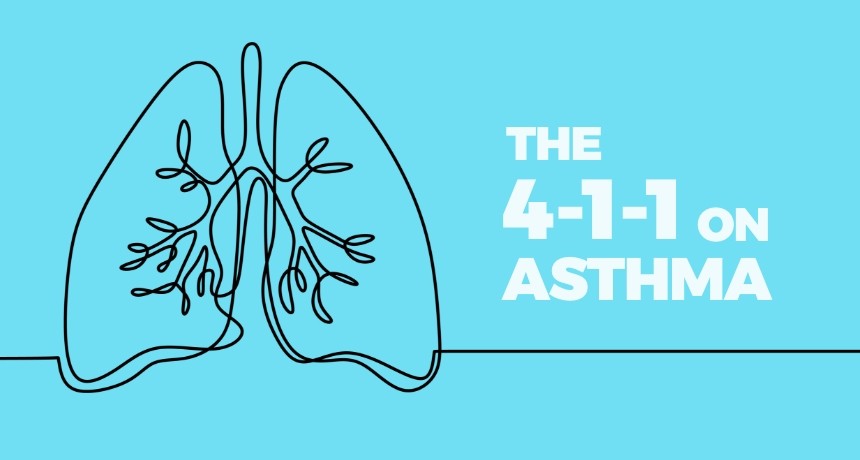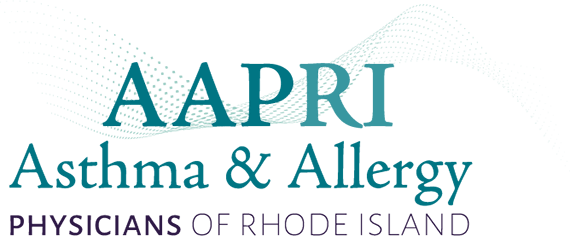The first A in our name AAPRI stands for asthma. But what exactly is asthma? In his book, Allergy Free with Dr. Z: Understanding Allergies, Asthma, and Much, Much More, Dr. Z describes asthma is “a hypersensitivity of the airways with a tendency toward constriction and swelling.” This means that when a person with asthma encounters a trigger—such as a change in temperature, specific irritants like cigarette smoke or perfume, or even exercising—their body responds by closing off the airways. Now let’s take a closer look at asthma and what can you do about it with Dr. Z.

What is asthma?
According to the National Heart, Lung, and Blood Institute (NHLBI), asthma is a chronic (long-term) condition that affects the airways in the lungs, which carry air in and out of your lungs. With asthma, the airways can become inflamed and narrowed at times, making it harder for air to flow out of the airways when exhaling, or breathing out.
Common asthma symptoms
People with asthma usually feel a shortness of breath accompanied by a tight chest, wheezing, and coughing. The NHLBI points out that other conditions can cause these symptoms, but in asthma they often follow a pattern in which symptoms:
- Come and go within the same day
- Start with a viral infection and get worse
- Triggered by exertion, allergies, cold air, fast breathing
- Tend to be worse at night or in the morning
Types of asthma
Asthma can develop at many different points in a person’s life, and with varying degrees of severity. Here Dr. Z gives some examples of the classic types of asthma he sees in his office.
Atopic asthma – This is asthma that’s often triggered by or associated with allergies. Dr. Z discusses a patient who was allergic to eggs, milk, and peanuts and had a bad case of eczema as a young child. By the time he was 4 years old, his eczema cleared up but he started to develop seasonal allergies, and as he grew up colds would end up going into his chest. Any activities that drastically increased his heart rate or led to open-mouthed breathing would trigger his asthma within a matter of minutes. By the time he was 12, Dr. Z started him on allergen immunotherapy and his symptoms improved greatly. “About 50 percent of children with severe eczema will ultimately develop asthma,” says Dr. Z.
Cough-type asthma – Patients who respond to inflammation of the airways by coughing rather than wheezing are diagnosed with cough-type asthma, which is fairly common particularly in the pediatric population. “When parents hear their children coughing all the time, it could be asthma or it could be postnasal drip. When coughing comes more from the upper airway than the lower, it may be an indication of sinusitis,” says Dr. Z. “Remember, if one treatment plan isn’t showing results, make a new one.”
Exercise-induced asthma – Typically patients with this type of asthma have baseline asthma that worsens with triggers brought on by physical activity. As ventilation and air exchange increase, or as the airways cool off, it can cause the chest to tighten and wheezing begins—usually about 15 minutes into the exercise.
Late-onset asthma – Sometimes people who are healthy and have never had any allergies can develop asthma later in life. Dr. Z describes a patient in her late 30s who had been otherwise healthy, but started developing sinus symptoms and headaches that become more frequent. Her symptoms progressed and she started to have severe wheezing and shortness of breath until one day she couldn’t breathe and had to be rushed to the hospital. She was found to have severe late-onset asthma, which as Dr. Z notes, “can be scary for patients because it seems to come out of the blue.”
Treating asthma
Dr. Z recommends consulting with your physician to determine the best treatment method for your asthma. One of the most common treatments comes in the form of a steroid taken through an inhaler. However, allergen immunotherapy, which can be taken as allergy drops sublingually or allergy shots administered in the doctor’s office, is an effective treatment for both allergies and asthma. In fact, Dr. Z got his own childhood asthma under control with immunotherapy.
How Dr. Z Got His Asthma Under Control
Do you think you or someone you care for might have asthma? Schedule a consultation with Dr. Z or any of our dedicated team members to learn more.

